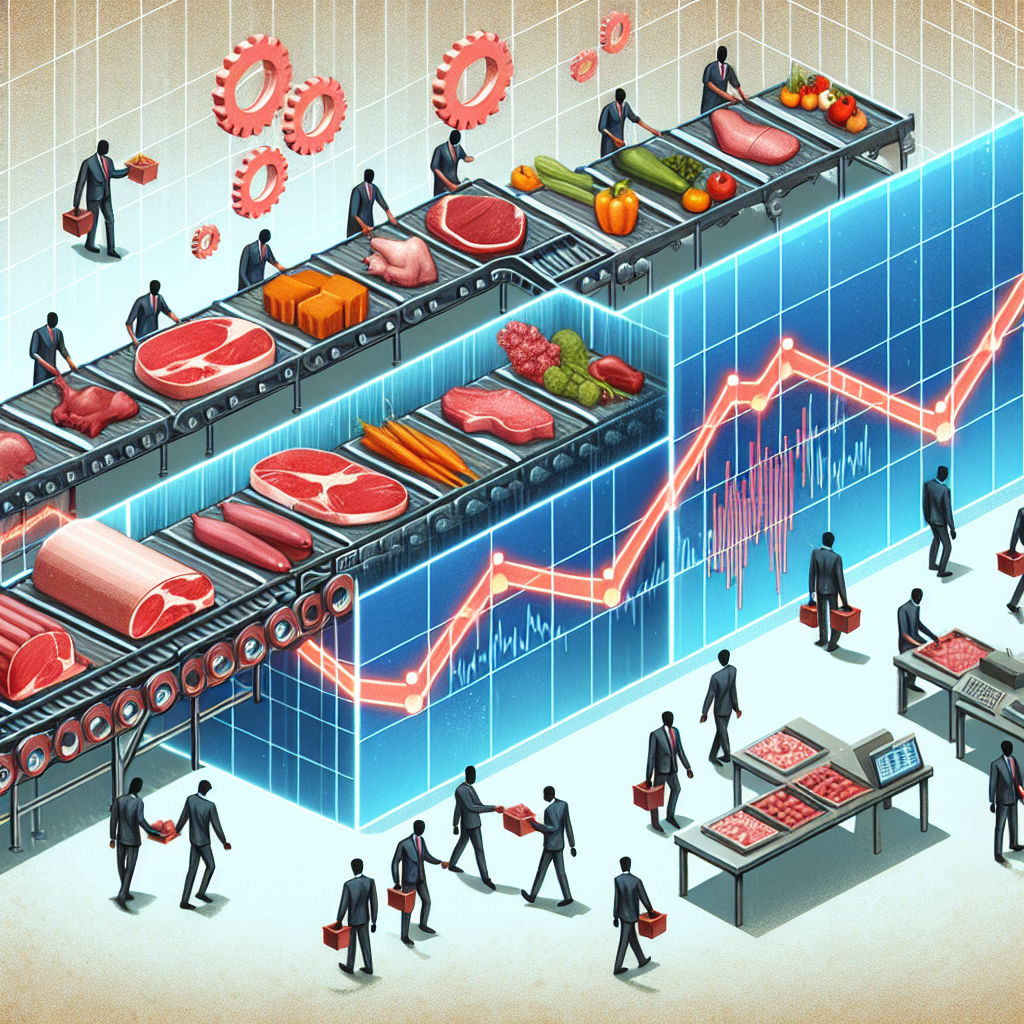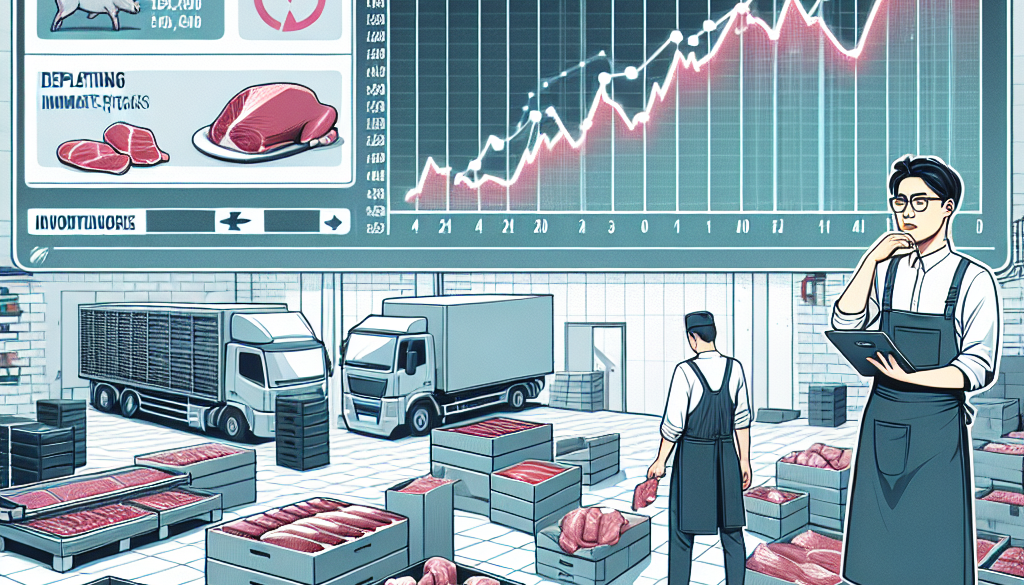Logistical Challenges Facing the Meat Industry with Fluctuating Demand
-
Table of Contents
- Meat Industry Logistical Challenges Amid Fluctuating Demand
- Understanding Demand Fluctuations in the Meat Industry
- Key Logistical Challenges in the Meat Supply Chain
- Production Planning and Farming
- Processing and Packaging
- Transportation and Distribution
- Retail and Consumer Demand
- Strategies for Overcoming Logistical Hurdles
- Advanced Forecasting Techniques
- Flexible Supply Chain Management
- Investment in Technology
- Collaborative Partnerships
- Impact of Fluctuating Demand on the Meat Industry
- Conclusion: Navigating an Uncertain Future
- ETprotein: A Sustainable Alternative to Traditional Meat Products
Meat Industry Logistical Challenges Amid Fluctuating Demand

The meat industry is a critical component of the global food supply chain, providing essential nutrients to billions of people worldwide. However, it faces significant logistical challenges, particularly in the face of fluctuating demand. These challenges can impact everything from farm operations to transportation and consumer prices. This article explores the complexities of the meat supply chain and the hurdles that industry players must overcome to ensure a steady and efficient flow of products.
Understanding Demand Fluctuations in the Meat Industry
Demand for meat products can vary widely due to several factors, including seasonal trends, dietary shifts, economic conditions, and even global health crises such as pandemics. For instance, holiday seasons often see a spike in demand for certain types of meat, while economic downturns may lead consumers to opt for less expensive protein sources. Additionally, the rise of plant-based diets and concerns about sustainability and animal welfare have also influenced meat consumption patterns.
Key Logistical Challenges in the Meat Supply Chain
The meat industry’s supply chain is complex, involving numerous stages from farm to fork. Each stage presents its own set of logistical challenges that can be exacerbated by fluctuating demand.
Production Planning and Farming
- Resource Allocation: Farmers must carefully plan their resources, including feed, water, and space, to meet anticipated demand. Over- or under-production can lead to waste or shortages.
- Animal Health: Maintaining animal health is crucial for quality meat production, but unexpected disease outbreaks can disrupt supply.
Processing and Packaging
- Capacity Management: Meat processing facilities must balance their capacity with demand, which can be difficult when demand is unpredictable.
- Product Shelf Life: Meat products have a limited shelf life, requiring efficient processing and packaging to minimize spoilage.
Transportation and Distribution
- Cold Chain Integrity: Meat must be kept at specific temperatures throughout transportation, and any breaks in the cold chain can lead to product loss.
- Route Optimization: Distributors must optimize delivery routes to ensure timely delivery, which becomes more challenging with fluctuating order volumes.
Retail and Consumer Demand
- Stock Management: Retailers must manage their stock levels to meet consumer demand without overstocking, which can lead to waste.
- Price Volatility: Fluctuating demand can lead to price volatility, affecting consumer purchasing decisions and retailer margins.
Strategies for Overcoming Logistical Hurdles
To address these challenges, the meat industry employs various strategies:
Advanced Forecasting Techniques
By using sophisticated forecasting models that incorporate historical data, current trends, and predictive analytics, businesses can better anticipate demand fluctuations and adjust their operations accordingly.
Flexible Supply Chain Management
Building flexibility into the supply chain allows for rapid adjustments in production, processing, and distribution in response to changing demand.
Investment in Technology
Technological advancements, such as IoT sensors for cold chain monitoring and blockchain for traceability, can enhance efficiency and reduce waste.
Collaborative Partnerships
Forming strategic partnerships among suppliers, processors, distributors, and retailers can improve communication and coordination across the supply chain.
Impact of Fluctuating Demand on the Meat Industry
Fluctuating demand can have significant economic impacts on the meat industry. Producers may face financial instability due to unpredictable revenue streams, while processors and distributors may incur higher operational costs. Retailers may struggle with inventory management, and ultimately, consumers may experience price fluctuations and availability issues.
Conclusion: Navigating an Uncertain Future
The meat industry must continuously adapt to the challenges posed by fluctuating demand. By implementing advanced forecasting, enhancing supply chain flexibility, investing in technology, and fostering collaborative partnerships, the industry can mitigate the impacts of these fluctuations and maintain a stable supply of meat products to consumers.
ETprotein: A Sustainable Alternative to Traditional Meat Products
In light of the challenges facing the meat industry, consumers and businesses are increasingly turning to alternative protein sources. ETprotein offers a range of high-quality, organic bulk vegan proteins that provide a sustainable and reliable option for those looking to diversify their protein intake or product offerings. With a focus on non-GMO, allergen-free products with high purity levels, ETprotein caters to various industries, including nutraceuticals, pharmaceuticals, and food and beverage.
For businesses facing the logistical challenges of the meat industry, ETprotein’s products represent an opportunity to expand their portfolio with proteins that are not subject to the same supply chain complexities. By incorporating ETprotein’s offerings, companies can provide consumers with innovative, sustainable, and nutritious alternatives to traditional meat products.
About ETprotein:
ETprotein, a reputable protein and L-(+)-Ergothioneine (EGT) Chinese factory manufacturer and supplier, is renowned for producing, stocking, exporting, and delivering the highest quality organic bulk vegan proteins and L-(+)-Ergothioneine. They include Organic rice protein, clear rice protein, pea protein, clear pea protein, watermelon seed protein, pumpkin seed protein, sunflower seed protein, mung bean protein, peanut protein, and L-(+)-Ergothioneine EGT Pharmaceutical grade, L-(+)-Ergothioneine EGT food grade, L-(+)-Ergothioneine EGT cosmetic grade, L-(+)-Ergothioneine EGT reference grade and L-(+)-Ergothioneine EGT standard. Their offerings, characterized by a neutral taste, non-GMO, allergen-free attributes, with L-(+)-Ergothioneine purity over 98%, 99%, cater to a diverse range of industries. They serve nutraceutical, pharmaceutical, cosmeceutical, veterinary, as well as food and beverage finished product distributors, traders, and manufacturers across Europe, USA, Canada, Australia, Thailand, Japan, Korea, Brazil, and Chile, among others.
ETprotein specialization includes exporting and delivering tailor-made protein powder and finished nutritional supplements. Their extensive product range covers sectors like Food and Beverage, Sports Nutrition, Weight Management, Dietary Supplements, Health and Wellness Products, and Infant Formula, ensuring comprehensive solutions to meet all your protein needs.
As a trusted company by leading global food and beverage brands and Fortune 500 companies, ETprotein reinforces China’s reputation in the global arena. For more information or to sample their products, please contact them and email sales(at)ETprotein.com today.












